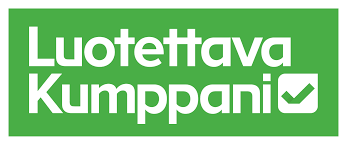Glass for Professionals
Solutions from glass
We serve glass- and glazing companies and construction and renovation companies throughout Finland as a wholesaler of floatglass and glass fittings and as a processor of flatglass products. We also supply building glass such as tempered glass, railing glass, glass walls, etc., as well as furniture and mirror glass for furniture suppliers. All glass accessories also from us; hinges, handrail fittings, mounting rails, etc. Complete set from one place!


A wide variaty of glass types
In our production we have the capability to process glass by conventional glass-cutting and waterjet-cutting. Edge polishing is done with straight- or shape-edge polishing machines. At the end of the production, glasses are washed and visually inspected against a lighting module which is mounted on the vertical washing machine. With waterjet we can cut also other materials, such as steel, stone, tiles, etc. Additionally, we have a chemical tempering oven, in which we can temper extremely small and thin glasses, without optical distortion of the glass and to reach higher durability than with heat tempering.
We are able to deliver all glass sub-products in precision machined and ready-to-install elements. Also specially glasses such as anti-reflections, borosilicate and aluminosilicate glasses.
With all of the above taken into consideration, we believe we have the most comprehensive range of flatglass-related products and services in Finland, possibly even Scandinavia.
We are happy to serve you also in English!
Our product categories
Chemically strengthened glass
Chemically strengthened glass is a type of glass that has increased strength as a result of a postproduction chemical process. When broken, it still shatters in long pointed splinters similar to float glass. For this reason, it is not considered a safety glass and must be laminated if a safety glass is required. However, chemically strengthened glass is typically six to eight times the strength of float glass.
The glass is chemically strengthened by a surface finishing process. Glass is submersed in a bath containing a potassium salt (typically potassium nitrate) at 300 °C (572 °F). This causes sodium ions in the glass surface to be replaced by potassium ions from the bath solution.
These potassium ions are larger than the sodium ions and therefore wedge into the gaps left by the smaller sodium ions when they migrate to the potassium nitrate solution. This replacement of ions causes the surface of the glass to be in a state of compression and the core in compensating tension.
The surface compression of chemically strengthened glass may reach up to 690 MPa.
The strengthening mechanism depends on the fact that the compressive strength of glass is significantly higher than its tensile strength. With both surfaces of the glass already in compression, it takes a certain amount of bending before one of the surfaces can even go into tension.
More bending is required to reach the tensile strength. The other surface simply experiences more and more compressive stress. But since the compressive strength is so much larger, no compressive failure is experienced.
There also exists a more advanced two-stage process for making chemically strengthened glass, in which the glass article is first immersed in a sodium nitrate bath at 450°C (842°F), which enriches the surface with sodium ions. This leaves more sodium ions on the glass for the immersion in potassium nitrate to replace with potassium ions. In this way, the use of a sodium nitrate bath increases the potential for surface compression in the finished article.
Chemical strengthening results in a strengthening similar to toughened glass. However, the process does not use extreme variations of temperature and therefore chemically strengthened glass has little or no bow or warp, optical distortion or strain pattern. This differs from toughened glass, in which slender pieces can be significantly bowed.
Also unlike toughened glass, chemically strengthened glass may be cut after strengthening, but loses its added strength within the region of approximately 20 mm of the cut. Similarly, when the surface of chemically strengthened glass is deeply scratched, this area loses its additional strength.
Another negative of chemically strengthened glass is the added cost. While tempered glass can be made cheaply through the fabrication process, chemically strengthened glass has a much more expensive route to the market. These costs make the product prohibitive for use in many applications. However chemical tempering is only possibility in strengthening of thin and/or very small glass. For ex. cell phone glasses.
Bigger pieces of chemically strengthened glass was used for ex. for the TGV train windshields. Autocar industry is as well strongly interested in chemically strengthened windshields.
Let us help finding the best solution
Kai Tammela
0400 633 744
kai@lasimyynti.fi
Jani Tammela
0500 234 711
jani@lasimyynti.fi
Wholesale and Exhibition
Our wholesale is open
Mon-Fri 8 am - 4 pm
Our exhibition space is open
Mon-Fri 10 am - 4 pm

Contact us



